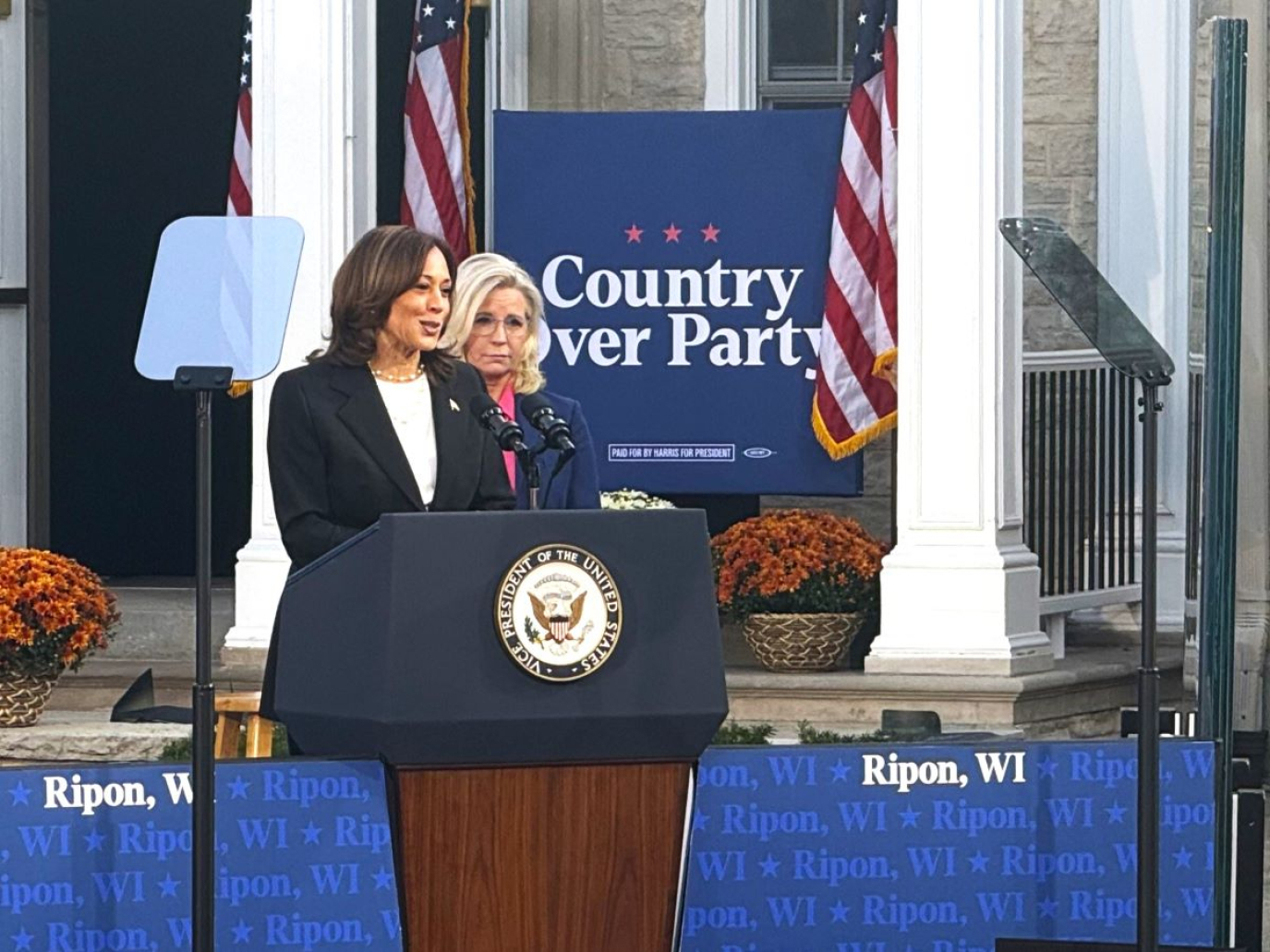This article is also available in Italian / Questo articolo è disponibile anche in italiano
From Ripon, Wisconsin - “Go Kamala!” sings Laura Evans. The sun shines brightly on the line of supporters who have been waiting for hours to enter Ripon College and hear the US Vice President speak. People have to arrive hours early to secure a spot and give the Secret Service time to check the perimeter of the event, including the press. Despite volunteers distributing water bottles, some people were dizzy from the heat. However, the excitement makes the intense afternoon sun more bearable. Laura, a social worker from Fond du Lac, shields herself with a baseball cap commemorating the Harris-Walz campaign. Yet, pinned to her shirt are two surprising badges, both reading: Republicans for Harris.
Alongside Wisconsin teamsters, LGBT and pro-choice activists, and first-time voting college students, there is a significant presence of moderate Republicans. It is no coincidence that the election rally on the 3rd of October was held in Ripon, Wisconsin. It was here that in 1854 at the Little White Schoolhouse, one of the key meetings for the formation of the Republican Party took place. It holds symbolic significance for the GOP, the Grand Old Party, as they used to call the party turned upside down in the last 10 years by Trump's MAGA populism.
Kamala Harris aims to persuade undecided and moderate Republicans not to vote for Trump, focusing her efforts on key states crucial for re-election, such as Wisconsin and Michigan. And some have already joined her. At 5:15 pm, on the Ripon College stage, surrounded by garlands and a large "Country over Party" sign, Congresswoman Liz Cheney, daughter of former Vice President Dick Cheney, a Wisconsin native, staunch Republican, and fierce opponent of Donald Trump, makes her entrance. The reception is warm as if the audience has forgotten the controversies surrounding her father, the architect of the War on Terror, and the hundreds of thousands of deaths in Iraq, where the supposed “weapons of mass destruction” were never found. Then again, the sins of the fathers should not be visited upon their sons and daughters.
“Donald Trump is a danger to our country, which is why I will vote for Kamala Harris,” promises Liz Cheney, drawing a standing ovation. “Liz, we love you!” a girl shouts from the stage. Cheney reclaims her Republican and conservative identity: “I’ve been a part of this party long before Donald started getting his spray tan.” She then emphasises her commitment to the constitutional order: “There is no value more conservative than respect for the US Constitution.”
Team Harris is placing significant emphasis on distancing the GOP from Donald Trump. To date, according to a media briefing, over 100 conservative national security officials and more than 200 former staffers from the Bush Jr, McCain, and Reagan administrations have endorsed Vice President Harris. Additionally, figures such as Dick Cheney, former Arizona Senator Jeff Flake, former Georgia Lieutenant Governor Geoff Duncan, and former Trump officials, including White House Press Secretary Stephanie Grisham and former aide Cassidy Hutchinson, have expressed their full support for Kamala Harris’s presidential campaign. Meanwhile, Mike Pence is making it clear that he will certainly not support Trump.
Waiting for Kamala Harris
Shortly after 5:35 pm, it was time for Kamala Harris to take the stage, introduced by Cheney herself. Her message centres on two key points: we need unity in the country, but we cannot and must not − forget what happened on the 6th of January 2021, when Capitol Hill was attacked in an attempt to thwart Joe Biden's confirmation to the White House. She also addressed the news of the day, specifically the new indictments against the former President, who would not be protected by the immunity granted by the recent Supreme Court ruling. According to Special Counsel Jack Smith, the “increasingly desperate” efforts of the former President and his allies to subvert the results of the presidential election “fall within the private sphere” and do not pertain to the President's official duties. As such, they are not protected by the presidential immunity upheld by a majority of the Court's nine justices. Among the most serious testimonies, which Liz Cheney also referenced in her speech, was that of Trump's aide. When Pence was in grave danger, with rioters wanting to hang him, Trump was informed in the hope that he would intervene. However, his reaction was uncaring: “So what?”
“He refused to accept the will of the people and the results of free and fair elections. He sent an armed mob to the US Capitol, where they assaulted law enforcement officers,” says Harris. “He made death threats against his own vice-president and has refused to engage in a peaceful transfer of power. We need to know how he intends to wield power if he is elected again,” Kamala thunders.
She concludes by calling for bipartisan unity. “If the citizens of Wisconsin and the nation are willing to do what Liz is doing − standing up for the rule of law, our democratic ideals, and the US Constitution − then, together, we can chart a new way forward [New Way Forwards, one of the campaign slogans, editor's note]. Not as members of a party, but as Americans, united in our devotion to the country we love.”
The battle of Wisconsin
Driving along Highway 73 from Madison to Ripon, one can almost map the electoral geography of Wisconsin. Virtually every house displays a yard sign indicating support for either Harris or Trump. Support for the Democrats grows denser as you approach the state capital, while Trump’s backing remains strong on rural farms where dairy cows are raised, given that cheese is the state’s main product. For every sign supporting Kamala, there seems to be an equal one for Trump. Indeed, polling data indicates that the candidates in this crucial election state are virtually neck and neck.
Harris's lead since early August has been slightly diminished by the strength of Trump's message on economic issues − a potentially concerning development for the vice president, as the economy remains the foremost issue for voters, particularly in a rural state like Wisconsin. Currently, Harris holds a slim margin, with 49% of the vote compared to Trump’s 47%. While the appeal to tradition and respect for the Constitution may not resonate with a large number of voters, past US elections have taught us that even a mere hundred votes can make a significant difference.
Images: Emanuele Bompan



